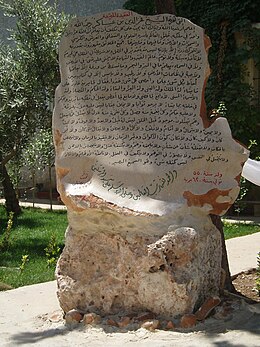Al-Qastallani
Ahmad ibn Muhammad Al-Qastallani | |
|---|---|
| Personal | |
| Born | 851 AH/ 1448 CE [1][2][3] |
| Died | 923 AH [1][5] 8 Muharram [2] 1517 (aged 68–69)[3] |
| Religion | Islam |
| Era | Medieval era |
| Denomination | Sunni |
| Jurisprudence | Shafi'i[1] |
| Creed | Ash'ari[4] |
| Part of a series on | ||||||||||||
| Ash'arism | ||||||||||||
|---|---|---|---|---|---|---|---|---|---|---|---|---|
 Rock carved with al-'Aqida al-Murshida by Ibn Tumart | ||||||||||||
| Background | ||||||||||||
| ||||||||||||
| ||||||||||||
| Theological works
| ||||||||||||
| Institutions | ||||||||||||
| ||||||||||||
|
Shihāb al-Dīn Abu'l-‘Abbās Aḥmad ibn Muḥammad ibn Abī Bakr al-Qasṭallānī al-Qutaybī al-Shāfi‘ī (Arabic: أحمد بن محمد ابن أبي بكر ابن عبد الملك بن أحمد بن حسين بن علي القسطلاني المصري الشافعي), also known as Al-Qasṭallānī was a Sunni Islamic scholar who specialized in hadith and theology.[1] He owed his literary fame mainly to his exhaustive commentary on the Sahih al-Bukhari entitled Irshād al-Sarī fī Sharḥ al-Bukhārī.[1]
Life
He was married to 'Aishah al-Ba'uniyyah.[2]
He was a contemporary of Suyuti, and between the two there were several scholarly challenges, Arabic: 'Khusumat'. The subject of the arguments were focused on al-Qasṭallānī's Shaykh al-Sakhawi, but eventually al-Qasṭallānī went to Suyuti to apologize.[6]
Views
Qasṭallānī settled on the Shāfi‘ī school later in life, though he was initially a follower of the Maliki school in jurisprudence. In regard to Islamic theology, Qasṭallānī was a proponent of the Ash'ari school for which he is considered one of the main figureheads.
Works
- Al-Muwahib al-Ladunniyyah bi al-Minah al-Muhammadiyya
- Irshad al-Sari, 10 vol,[7] one of the best commentaries on Sahih Bukhari
- Masālik al-Ḥunafā’ ilā Mashāri‘ al-Ṣalāt 'alā al-Nabī al-Muṣṭafā [2]
- Minhaj al-Ibtihāj Sharḥ Muslim b. al-Ḥajjāj, a commentary on Sahih Muslim[2]
- al-Jannāt al-Dānī fī Ḥall Ḥirz al-Amānī, a commentary on the Shatibiyyah[2]
- al-Fatḥ al-Mawāhibī, a biography of the author of Shatibiyyah[2]
- A commentary on the Burda[8]
- Maqamat al-‘Ārifīn[8]
See also
References
- ^ a b c d e Lewis, B.; Menage, V.L.; Pellat, Ch.; Schacht, J. (1997) [1st. pub. 1978]. Encyclopaedia of Islam. Vol. IV (Iran-Kha) (New ed.). Leiden, Netherlands: Brill. p. 736. ISBN 9004078193.
- ^ a b c d e f g Sakeenah: Luminaries
- ^ a b "Kitab al-mawahib al-laduniyya bi-lminah al-muhammadiyya Qastallani, Ahmad b. Muhammad al-,. 1448-1517 Catálogo de la Biblioteca del Instituto Cervantes de TÁNGER". Archived from the original on 2007-03-12. Retrieved 2006-09-27.
- ^ El-Rouayheb, Khaled (2015-07-08). Islamic Intellectual History in the Seventeenth Century. Cambridge University Press. p. 273. ISBN 9781107042964.
- ^ Abdal-Hakim Murad - Contentions 8
- ^ Aḥmad ibn ‘Alī al-Dumyāṭī, Muqaddimah Taḥqīq Kitāb al-Itqān fī ‘Ulūm al-Qur’ān li-Suyūṭī, Dār al-Ḥadīth, 1425H
- ^ arabic_reference_works.html
- ^ a b Lewis, B.; Menage, V.L.; Pellat, Ch.; Schacht, J. (1997) [1st. pub. 1978]. Encyclopaedia of Islam. Vol. IV (Iran-Kha) (New ed.). Leiden, Netherlands: Brill. p. 737. ISBN 9004078193.
External links

 | This article about an Islamic scholar is a stub. You can help Wikipedia by expanding it. |
- v
- t
- e


















